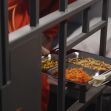In a showdown between a religious ritual that involves the sacrificial killing of chickens and the First Amendment’s guarantee of religious freedom, religion has triumphed.
On the day before Yom Kippur, the Jewish Day of Atonement and the holiest day of the Jewish year, some members of the Orthodox Jewish faith practice Kapparot, an ancient ceremony that seeks to symbolically transfer human sins onto chickens. During the ritual, worshipers slaughter chickens that they donate to feed the hungry. In 2018, three animal rights activists challenged the right of a group of Los Angeles Orthodox Jews to carry out their tradition at the Hebrew Discovery Center in Woodland Hills.
Even though the chickens at the Discovery Center were discarded instead of used to feed the poor, the plaintiffs argued that the City abused its discretion when it refused to enforce §597(a) of the California Penal Code that prohibits the “intentional and malicious killing of animals.” They claimed the animal rights law that bars malicious and intentional mutilation, torturing or wounding animals was violated.
Lead plaintiff/appellant Lisa Karlan and two colleagues sued respondents, the City and the Los Angeles Police Department (LAPD), for abuse of discretion when they failed to enforce the law. They sought damages as well as declaratory and injunctive relief. Plaintiffs also alleged that Police Captain Paul Vernon violated both the Tom Bane Civil Rights Act and the Ralph Civil Rights Act of 1976 when he threatened to arrest the activists if they used a projector or amplified sound during their protest.
The Bane Act forbids people from interfering with a person’s constitutional rights by force or threat of violence. The Ralph Civil Rights Act empowers the Department of Fair Employment and Housing to “protect people with special characteristics from violence or intimidation.” Violation constitutes a hate crime. Karlan also argued that the City had violated the Establishment Clause of the First Amendment, which prohibits Congress from making any laws respecting the establishment of religion.
Los Angeles Superior Court Judge Mary H. Strobel sustained a demurrer to Karlan’s cause of action that sought relief, and Judge Robert B. Broadbelt affirmed Strobel’s dismissal. The animal rights activists appealed to a three-judge panel from Division Four of California’s Second District Court of Appeal. In an unpublished opinion authored by Justice Audra Mori, the court found on November 27 that the city did not abuse its discretion as a matter of law, and plaintiffs failed to “demonstrate how the City acted unreasonably and arbitrarily.”
The legality of the practice of Kapparot was taken up by the Board of Commissioners of the Los Angeles Department of Animal Services (LADAS) in 2017. One Commissioner described it as “a barbaric ritual” that is not followed by a majority of Jews. At the meeting, a city attorney noted that “Since courts have failed to make any clear decision that this is a violation of law, without infringing on the actual ceremony, our goal is to make sure that the animals in transportation, holding, feeding and watering are humanely taken care of.”
At a subsequent hearing, another Commissioner “advised” the Department against the enforcement of the Penal Code. A public protest followed at which Vernon threatened to arrest the demonstrators. Karlan and her fellow activists, who had sought to make a citizens’ arrest of the religious practitioners, then filed a complaint that had four causes of action against the LAPD Captain. They wanted an order demanding Vernon to enforce §597(a) of the California Penal Code and sought rulings that said Vernon abused his discretion when he created an illegal and unconstitutional exception to the law. The City demurred to all complaints, and after hearings, the trial court sustained all the demurrers.
Mori’s opinion first explained that demurrers can be sustained when a “pleading alleges facts sufficient to state a cause of action under any possible legal theory.” She ruled that plaintiffs had failed to adequately plead a cause of action because it is proper that the “City exercises its discretion to enforce criminal laws.” She wrote, “Under the separation of powers doctrine, appellants may not dictate “which laws are enforced and how, or against whom.” The opinion also found, “Appellants here fail to demonstrate how the City acted unreasonably and arbitrarily.”
In addition, Mori wrote, “We find nothing arbitrary or unreasonable in the City’s own decision on the issue following advice of counsel, and recognizing the potential for litigation by Kapparot practitioners if it were to enforce Penal Code section 597 against them.” She went on to rule that plaintiffs did not adequately present legal arguments that would require the court to repeal or amend the City ordinance that prohibits animal sacrifice motivated by religion. That challenge was thus forfeited.
The appellate court then considered plaintiffs’ arguments that respondents had violated both the Bane and Ralph Civil Rights Acts. Here, too, Mori concluded that “appellants have failed to plead sufficient facts to establish violations…” Appellants’ final argument claimed the respondents had violated the Establishment Clause of the First Amendment. This claim failed as well because the opinion agreed that appellants lacked “direct standing” to challenge the law, and their contention that they did have standing because they are taxpayers was improperly raised on appeal for the first time. Appellants, the opinion said, lacked “relevant legal authority and reasoned analysis.”
The Second District Court of Appeal thus affirmed the rulings of both trial court decisions. It should be noted that the Hebrew Discovery Center and an additional named defendant, Netanel Louie, were not parties to the appeal. Also, in 2021, a later case, Animal Protection and Rescue League v. City of Los Angeles, also affirmed a dismissal of claims by the animal rights activists.
At the time of the 2019 protest, the Los Angeles Times reported that many animal rights activists, some of whom were Jewish, said Kapparot was outdated and cruel. But for now, those who believe in it may continue to perform their constitutionally protected ritual.






